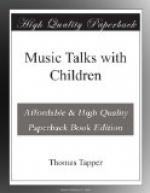When one has heard much music of all kinds, one soon begins to understand that there are two kinds commonly chosen. Some players choose true music with pure thought in it, and do their best to play it well after the manner called for by the composer. Their aim is to give truthful expression to the music of a good writer. Other players seem to work from a motive entirely different. They select music which is of a showy character, with much brilliancy and little thought in it. Their aim is not to show what good music is, but to show themselves. The desire of the first is truth, of the second is vanity.
Now, as we examine into this, and into both kinds of music, we discover much. It proves that we must work for the best; for the truthful music, not for the vain music. As we get better acquainted with true music we find it more and more interesting—it keeps saying new things to us. We go to it again and again, getting new meanings. But the showy music soon yields all it has; we find little or nothing more in it than at first. As it was made not from good thought but for display, we cannot find newer and more beautiful thought in it, and the display soon grows tiresome. True music is like the light in a beautifully-cut gem, it seems that we never see all it is—it is never twice the same; always a new radiance comes from it because it is a true gem through and through. It is full of true light, and true light is always opposed to darkness; and darkness is the source of ignorance.
From all this you can now understand the quaintly-expressed opinion of a very wise man, who said: “In discharge of thy place, set before thee the best example."[35] That means whatever we strive to learn should be learned from works of the best kind. In the beginning, we cannot choose wisely the best examples to set before ourselves; therefore it is for us to heed what another wise man said: “As to choice in the study of pieces, ask the advice of more experienced persons than yourself; by so doing you will save much time.” [36] You thereby save time doubly. Later on in your life you will have no bad taste to overcome—that is one saving; and already you know from childhood many classics, and that is another saving. What we learn in childhood is a power all our lives.
You can see plainly, now, that both in the choice of pieces and in the manner of playing them, a person’s character will come out. We saw in the last Talk how character has to come out in writing. Only a very common character would select pieces written entirely for a vain show—of rapid runs, glittering arpeggios, and loud, unmeaning chords. Worse than that, such a choice of pieces displays two common people,—three, in fact: A composer who did not write pure thought from the heart; a teacher who did not instil good thoughts into the pupil’s heart; and yourself (if really you care for such things) who play from a vain desire to be considered brilliant.




